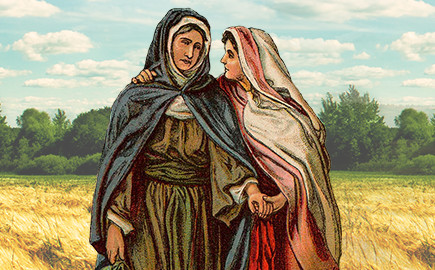Naomi and Ruth: Building a Relationship of Trust
10 July 2024

Have you ever watched a video of the retelling of the Book of Ruth? Have you ever noticed how quickly the tale unfolds? How quickly we get to that place where Ruth is at Boaz’s feet in the middle of night?
The story of Ruth seems to just move so smoothly from one end to the other. How is it that Naomi could have instructed Ruth to do something so scandalous as to make advances on a man in the middle of the night?
What we don’t see, without really diving in, is the depth of relationship that Naomi and Ruth had built up over time to get them to the place where Ruth would trust Naomi so much that she would follow such scandalous advice.
When I was reading Ruth this morning, one verse caught my attention, causing me to stop short and ponder:
So Ruth stayed close to the women of Boaz to glean until the barley and wheat harvests were finished. And she lived with her mother-in-law. Ruth 2:23, NIV
Here we have a woman who has followed her widowed mother-in-law, after having lost her own husband, to a land that was unknown to her. Naomi, Ruth’s mother-in-law, has some land and a place for the two of them to reside, but they have no money on which to live. So, Ruth, as was the custom and right of the widows in that day, went out to glean in the fields, to follow the harvesters and pick what they left behind or dropped (Deuteronomy 24:19-22).
Let’s stop here for a moment.
After Ruth’s husband died, Naomi decided to return to her own land, to her own people, so she released Ruth of any obligation to her, blessing Ruth to go back to her own mother’s home, to her own blood relatives, and find another husband, another family that could care for her. Naomi wanted the best for Ruth, but Ruth had already formed such a close relationship with Naomi that Ruth knew that the best for her was to continue learning under Naomi. This sets the stage for us with a mentor mentee relationship. As mentors, we need to be prepared to release, but we also need to be prepared to continue. Naomi and Ruth’s relationship was so healthy that they were able to be honest and trust one another, which enabled them to move forward together.
Now in Bethlehem, Ruth knows she needs to do what she can to care for her mother-in-law, so she asks permission of Naomi to go glean in the fields. This was actually a very dangerous task for a young woman as she could be caught alone and harmed by a man, but Ruth is willing to undertake this danger to care for Naomi.
Notice something interesting, here: for the first time, Naomi addresses Ruth as “daughter” (Ruth 2:2). This indicates a growing relationship that is reciprocal in nature. Not only does Ruth wish to care for Naomi, but Naomi is also recognizing Ruth affection for her and is reflecting that love back to her.
It just so happens that Ruth ends up gleaning in the fields of Boaz and Boaz takes notice. Boaz invites her to dine with him, encourages her to continue gleaning in his fields, offers her water from the harvester’s water jars, extends his promise of protection, and instructs his workers to drop extra grain for Ruth to pick up. But notice this: Boaz does all this for Ruth because Ruth has been a blessing to Naomi, his blood-relative (Ruth 2:10-11).
The story of Ruth is often portrayed in a manner that makes it seem as if Ruth had some eye-catching beauty that grabbed Boaz’s attention and made him stop short, but Ruth’s looks are never mentioned. What caught Boaz’s attention was Ruth’s willingness to sacrifice and care for Naomi. This is an inner beauty that spills out onto others. Whether or not Ruth may have been physically beautiful, we will never know. What we do know is that she was beautiful from the inside out and that Naomi’s close friendship and love of God must have played a part in developing Ruth’s inner beauty.
But let’s go back to chapter 2, verse 23, listed above. Ruth continued to glean until the end of both the barley and wheat harvests before any moves were made on her part to advance her relationship with Boaz. In fact, in chapter 3, verse 2, we learn that Boaz has gone back to winnowing barley. If we look at barley and wheat harvesting timetables in Israel, we learn that since Boaz is back to barley, a whole year has passed in Ruth’s timeline. During this year, Ruth has continued to glean in Boaz’s field under his protection and has lived with Naomi under her protection and her mentoring care. One can only assume that Ruth and Naomi have grown even closer together.
It is now that Naomi gives Ruth scandalous instructions. A woman caught alone with a man in the middle of night making sexual advances to him was dangerous, to put it mildly. Despite the fact that a year had passed, and this story did not unfold as quickly as we often fall prey to believing, Naomi’s words to Ruth were enough to make Ruth gasp and falter, but Ruth trusted Naomi so much that she was willing to heed Naomi’s advice and place herself in a very precarious position.
How often do we jump in and give someone instructions before building our relationship up enough to the point where our words can be trusted? To the point where, even though what we may have to say sounds “scandalous,” or bold, or frightening, or difficult to accomplish, the person to whom we deliver them sits up, pays attention, and moves on them because they know we are giving “right” instructions?
Ruth followed through with Naomi’s instructions, even though she may have had some trepidation at completing them, because she trusted Naomi and knew that Naomi was only looking out for her best, but getting to that point of trust took time. It took years of relationship building and quiet talks. I realize I am reading between the lines when I say that Naomi and Ruth had many discussions together, but who could believe that two women living under the same roof didn’t talk?
Good discussions, however, growing together well, requires that both parties talk and listen to each other. And because we know that Ruth trusted Naomi, we can assume that their strong relationship was built because both parties were willing to converse honestly with open ears to one another. Learning to know when to speak and when to listen and when to hold back words until the right time is a necessary part of mentoring. As mentors, we must rely on the Holy Spirit to give us the right words in the right moments, but those words will fall on deaf ears if we have not earned the right to speak into someone’s life by building a relationship of trust.
